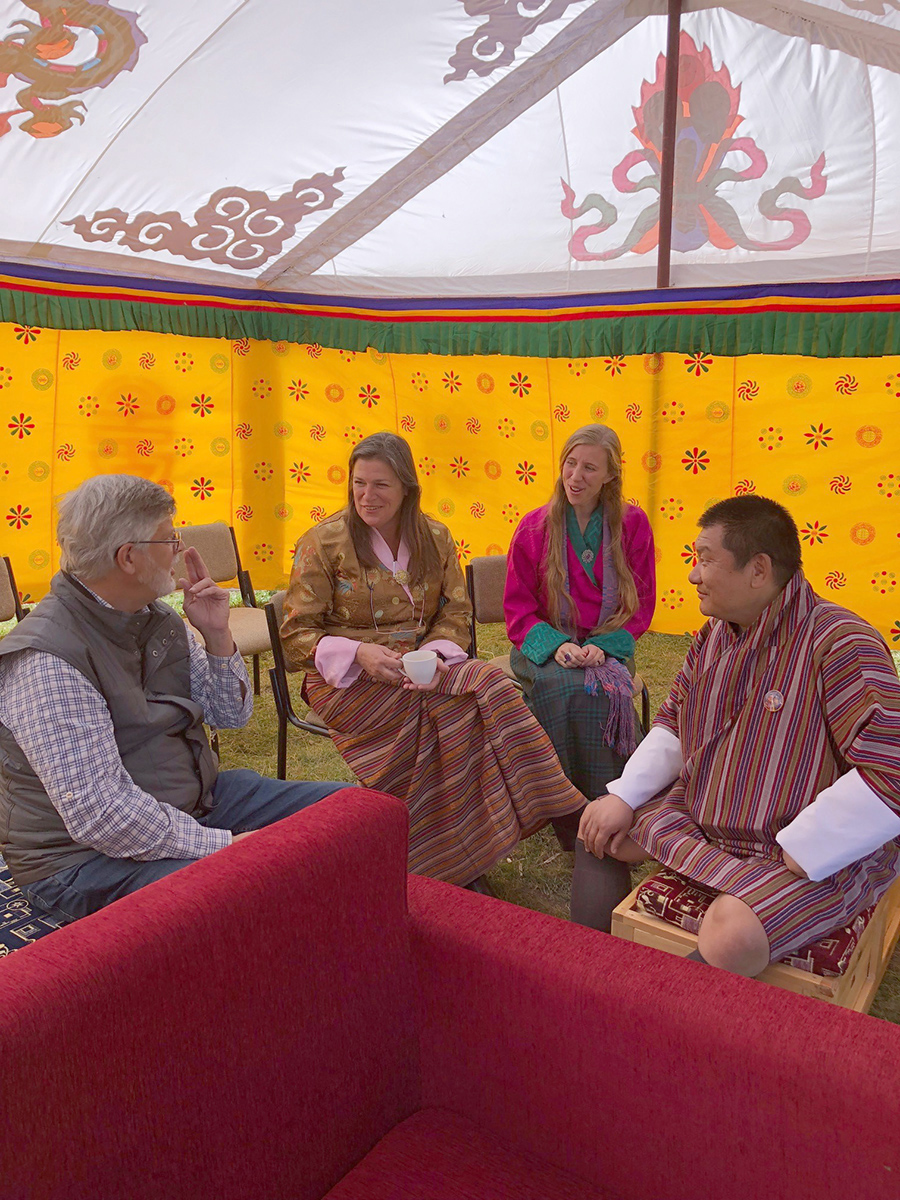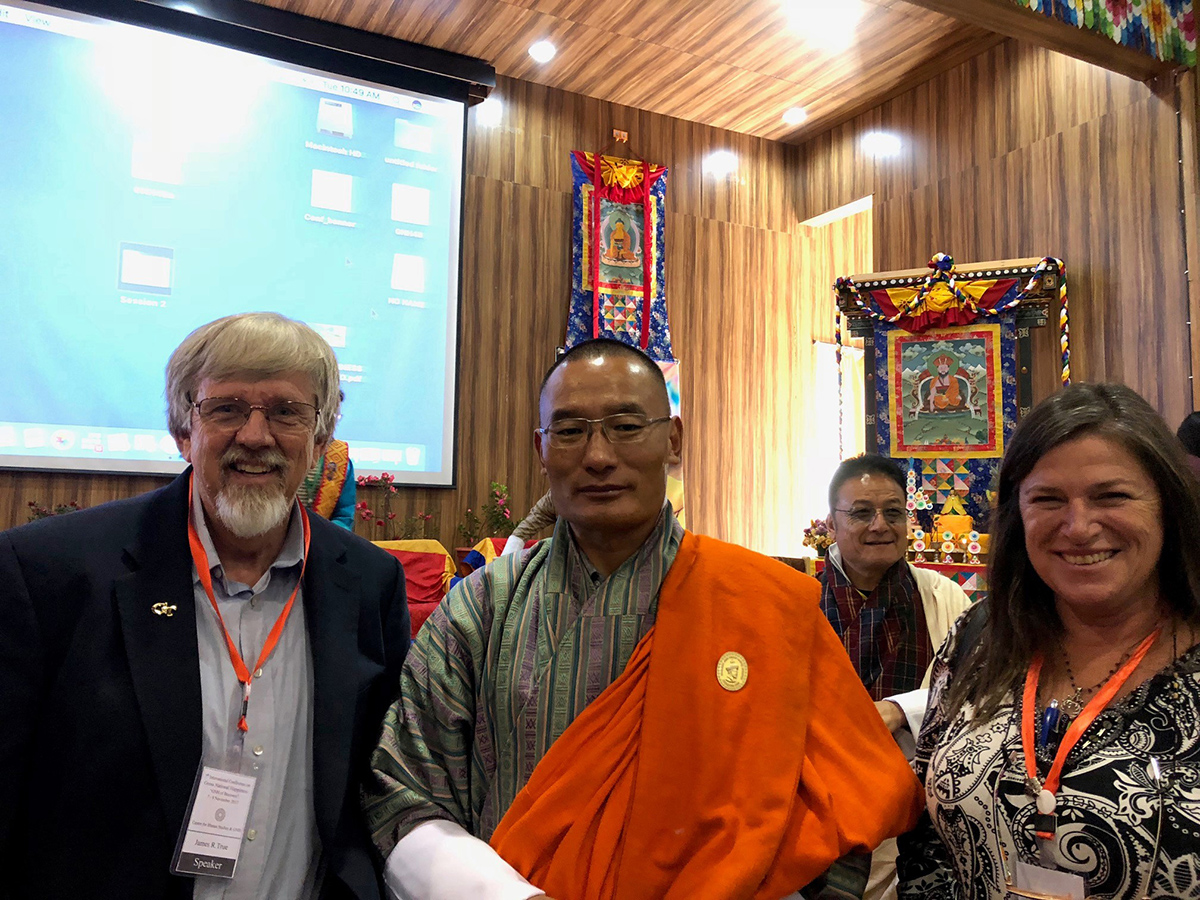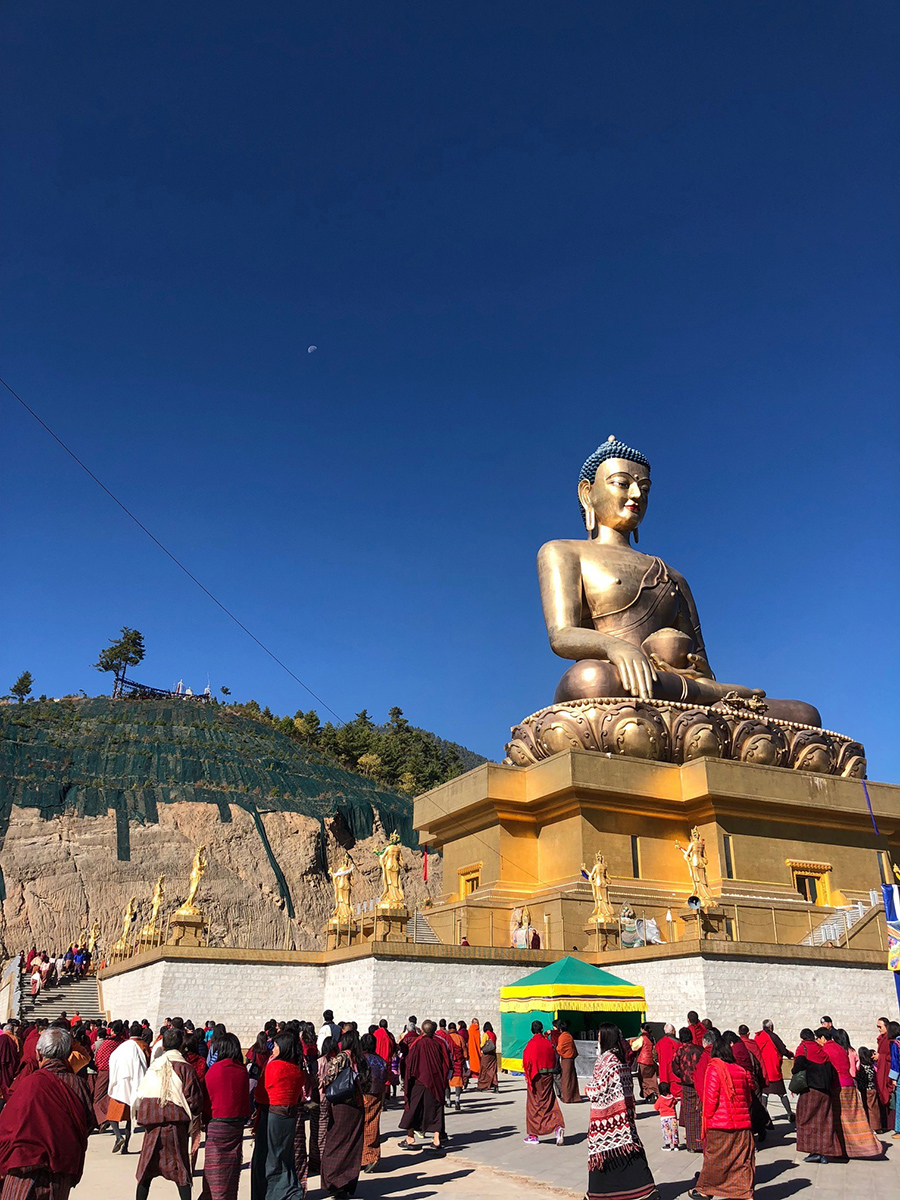
From left, Michael Philipp, a member of the National Council of the World Wildlife Fund and major supporter of the Bhutan for Life conservation initiative, CMC Aspen ESL professor Lorraine Miller, Dr. Mercedes Quesada-Embid, CMC Vail Valley sustainability studies professor, and Bhutan Minister of Agriculture and Forests Yeshey Dorji at Bhutan’s Royal Botanical Garden to honor Bhutan for Life’s launch during the GNH conference.
By Carrie Click
Imagine a country that’s governed based on the happiness of its people rather than measuring its success on its gross national product. Such a place exists in the Himalayas in southern Asia.
The Kingdom of Bhutan is east of Nepal and surrounded by India, Tibet and China. With 800,000 citizens, it’s just under 15,000 square miles – a bit smaller than Switzerland.
The Centre for Bhutan Studies & Gross National Happiness invited nearly 400 government leaders, academics, sociologists and scientists from 26 countries to attend the seventh international conference on gross national happiness, “GNH of Business.” in November. The interactive conference explored ways that businesses around the world currently achieve GNH, as well as ways to further promote the concept.
According to Investopedia.com, gross national happiness “attempts to measure the sum total not only of economic output, but also of net environmental impacts, the spiritual and cultural growth of citizens, mental and physical health and the strength of the corporate and political systems.”
Representatives from two Western Slope entities – the Aspen International Mountain Foundation and Colorado Mountain College – traveled over 7,500 miles to take part in the conference.
The Colorado delegation
Founded in 2001, the Aspen International Mountain Foundation evolved from Aspen community leaders working with the United Nations’ Environment Program, the City of Aspen, the Aspen Institute and Aspen Sister Cities, among others. The nonprofit corporation promotes sustainable development in the world’s mountain communities.

From left, Aspen City Attorney Jim True of the Aspen International Mountain Foundation, Bhutan Prime Minister Tshering Tobgay and CMC Aspen professor Lorraine Miller at the Gross National Happiness in Business conference in Thimphu, Bhutan. Tobgay gave the inaugural address. Photo Mercedes Quesada-Embid
Karinjo Devore, president of the foundation, initially received an invitation for the November conference though was unable to attend because of a prior commitment. AIMF board member and City of Aspen attorney Jim True, and his wife Vicky, made the trip.
“The invitation came to us, and we invited CMC to join us,” said True.
Lorraine Miller, a Colorado Mountain College Aspen faculty member who teaches developmental education and English as a Second Language, had visited Bhutan in 2016 while on sabbatical through an arrangement with AIMF. She spent a month experiencing how a visitor to a foreign country might feel lacking any knowledge of either the language or alphabet. Bhutan’s national language is Dzongkha, and the Tibetan alphabet is used in written communication. Miller knew neither.
While there, Miller established valuable connections between the Bhutan Trust for Environmental Conservation and Colorado Mountain College, and is now working with college faculty and administrators on a possible exchange with Bhutanese forest and park rangers.
“We wanted to promote the exchange,” said True. “We think it’s good for our organization, for CMC and for the Bhutanese.”
And Dr. Mercedes Quesada-Embid, lead professor of sustainability studies at CMC Vail Valley in Edwards, was a natural choice to join the delegation.
‘The source of all happiness’
Both True and Quesada-Embid gave presentations, while Miller chaired a panel on business enterprise.

This massive Buddha overlooks Bhutan's capital city of Thimphu. Approximately 75 percent of Bhutanese practice Buddhism. The principles of gross national happiness are rooted in Buddhist philosophy.
True said the conference featured a lot of high-level academic discussion, and that Quesada-Embid’s presentation was one of his favorites. In her talk, titled “Sustainability and Happiness: Bringing an Authentic Ethic to the Business Model,” Quesada-Embid explained how Colorado Mountain College operates in a way that integrates gross national happiness into its culture. “How CMC operates, the programs it chooses to support, the community relationships it builds – all contribute to or model many GNH principles,” she said.
“I have faith that what we call ‘human nature’ is not the greedy, competitive consumer individual,” she told the audience in Bhutan, “but instead that negative concept is a manifestation of humans’ lack of nature. Our human nature is indeed full of altruisms, spiritualities, cooperations and loves. There is mindful power in these qualities.”
True based his talk on the Aspen City of Wellbeing, an organization working to create healthy cultural shifts. Since the conference’s focus was on gross national happiness and business, True told of the Aspen Skiing Company, which relies on a healthy mountain environment for its continued business sustainability.
“In translating GNH to the private sector, I explained the ski company’s reliance on nature and the outdoors,” True said.
On a hike to a prominent Bhutanese monastery called Tiger’s Nest on the day before the conference, True said he saw a wooden sign at the trailhead that read, in part, “Preserve our natural heritage. Nature is the source of all happiness.”
“I thought that was so serendipitous to what I was going to present at the conference,” said True. “One of the Bhutanese participants said that hit a chord with him when I talked about that during my presentation.”

